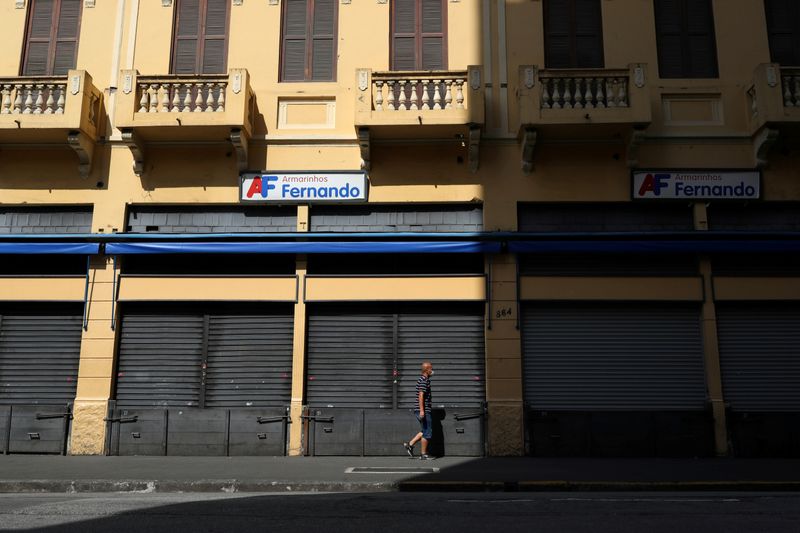By Jamie McGeever
BRASILIA (Reuters) - The scale of the coronavirus-induced economic crash expected in Latin America could upend the region's financial rules for years to come, throwing up big obstacles to re-imposing painful spending cuts and austerity.
Governments are spending unprecedented sums in the fight to minimize the economic and social damage from the pandemic, while in many cases insisting that public finances will recover once the crisis is over.
"The key question is whether COVID-19 will force economists and governments across Latin America - and ultimately global investors - to rethink the rules on fiscal discipline," said Thomaz Favaro, director at political consultants Control Risks.
"Should countries double down on upfront expenditure to ease the economic pain and help the recovery? Or do the old fiscal rules still apply? Governments may find it is politically untenable to double down on austerity," he said.
Economists at French bank BNP Paribas (PA:BNPP) have drawn up a "COVID-19 relative preparedness index" tracking how prepared 24 emerging market nations are to withstand the COVID-19 shock, relative to their peers.
(GRAPHIC: Emerging market COVID-19 "preparedness index" - https://fingfx.thomsonreuters.com/gfx/mkt/nmopayrdpab/EMINDEX-BNPPARIBAS.png)
The index comprised four sub-indexes broadly covering social, healthcare, financial and economic metrics. The main five Latin American economies fared relatively poorly, with only Chile in the top half and even then only in 15th place overall.
With the exception of Argentina, in tense negotiations with creditors to avoid defaulting on its international debt, all healthcare scores were very low. Brazil and Mexico also scored poorly in the social index ranking, while Argentina unsurprisingly scored poorly in its room for financial maneuver.
Based on traditional measures, the low rankings show little fiscal room to cope with the crisis and indeed some policymakers are warning that investors will demand more fiscal balance once it is over.
Brazilian Treasury Secretary Mansueto Almeida said this week that it would be a "mistake" to let emergency measures turn into permanent spending, which he said could put strained public finances under greater long-term pressure.
"The price of near-term relief may well be future faster and deeper fiscal adjustment, or financial/funding distress," Goldman Sachs (NYSE:GS) economists wrote in a research note.
But others say the already weak metrics make untenable the kind of swingeing cuts to welfare benefits and public services often demanded by "orthodox" financial rules in the past.
Some of the numbers being bandied about are without precedent. Goldman Sachs expects the region's economy to shrink by 3.8% this year, the biggest decline since World War Two. Economists at Morgan Stanley (NYSE:MS) think it will be even worse, and pencil in a 4.6% GDP crash.
Bank of America Merrill Lynch (NYSE:BAC) expects Mexico's economy, also clobbered by the collapse in oil prices, to contract by 8% this year, while Goldman sees the primary budget deficits in Brazil and Peru widening to as much as 9% of GDP.
"There is no easy way out of Brazil's conundrum right now," according to Morgan Stanley, projecting a fiscal deficit of more than 10% of GDP and national debt approaching 90% of GDP this year while the economy shrinks by 3.7%.
Similarly, they note the Mexican government's challenge of assuring markets that any fiscal slippage is temporary, while committing to medium- and long-term fiscal prudence. "We view such a task as daunting."
Millions of people will lose their jobs and the ranks of informal workers, which already accounts for up to 40% of employment in some countries, will grow rapidly.
Mexico and Colombia, whose revenues and tax takes will be decimated by the slump in oil prices, have already had their sovereign credit ratings downgraded.
Much of the mounting market pressure on emerging economies so far is being borne by exchange rates. While their steep depreciation this year has made them very cheap, many analysts reckon they can get cheaper still.
The Brazilian real and Mexican and Colombian pesos are among the biggest decliners in the world against the dollar so far this year, all losing around 20% of their value since Jan. 1. The slump in both pesos has been particularly heavy since oil's collapse a month ago.
Crucially, these historically weak exchange rates are not fueling inflationary pressures because economic activity, demand, and oil and commodity prices are falling so steeply. Central banks, themselves often fiscal scolds in the past, can maintain extraordinarily loose monetary policies.

Bank of America Merrill lynch reckons "a new prevailing policy regime" will emerge over the medium term. "Most countries are moving from a regime of tight fiscal and loose monetary policy, to a regime of loose fiscal and even looser monetary policy," they said.